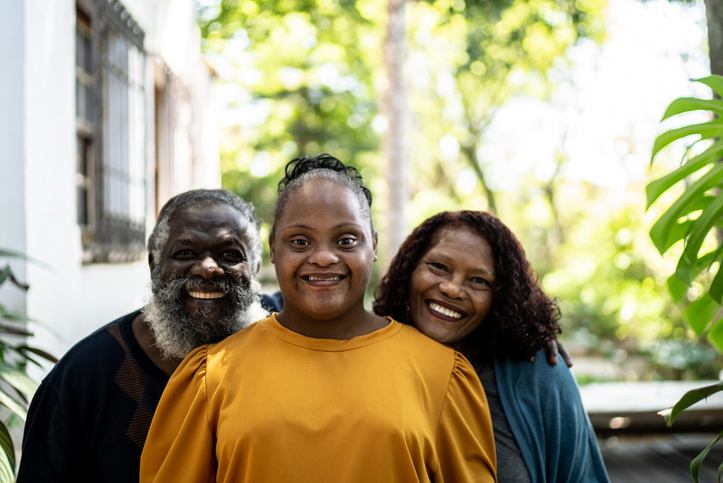Understanding Down Syndrome In The Black Community
Source: FG Trade / Getty
Down Syndrome (DS) is one of the most common chromosomal disorders in America. According to the Centers for Disease Control and Prevention, each year, about 6,000 babies are born with Down syndrome, which means that 1 out of every 700 babies is born with the condition. Thanks to scientific advancements in the world of health, people affected by the condition can now live healthier and longer lives. The Global Down Syndrome Foundation noted that the average lifespan of a person with Down Syndrome is approximately 60 years, a drastic jump from 1983 when life expectancy for a person with the condition was just 25 years.
Down Syndrome, which is also known as Trisomy 21, can develop in people of all races, but health disparities are growing among Black people who have the condition. Many experts have yet to figure out why. Here’s what we know about the growing issue.
What is Down Syndrome?
Down syndrome is a condition in which a person has an extra chromosome. Chromosomes are small clusters of genes in the body that determine how a baby’s body forms and functions as it grows during pregnancy and after birth. Typically, a baby is born with 46 chromosomes. However, babies with Down syndrome carry an extra copy of one of those chromosomes, called chromosome 21. In the medical world, doctors often refer to the extra copy as ‘trisomy.’
This extra copy can drastically change how a baby’s body and brain develop, which can cause mental, physical and developmental challenges. Common physical traits of Down syndrome include:
A flattened face, especially the bridge of the nose
Almond-shaped eyes that slant up
A short neck
Small ears
Many adults with DS can live normally, despite low to moderate cognitive function. They can attend work, vote and even go to college thanks to an increasing number of institutions offering specialized programs designed for students with disabilities like DS.
How does Down Syndrome impact Black People?
Multiple studies have found that Black or African-American infants with Down syndrome have a lower chance of surviving beyond the first year of life compared to white infants with Down syndrome. Scientists and medical experts are still trying to understand the disparity.
A study by the American Journal of Obstetrics & Gynecology found that Down syndrome rates increased over time among individuals who identified as Black, Hispanic, or American Indian/Alaskan Native, but not among white or Asian individuals. The study examined a cohort of 26,433,380 pregnancies that occurred in the US between 2012-2018 using linked vital statistics data.
The test examined 13,788 pregnancies with a 0.05 percent diagnosis rate of Down Syndrome compared to 26,419,592 pregnancies (99.95 percent) with no diagnosis of Down Syndrome. Over time, researchers found higher rates of DS in those who were Black, Hispanic and American Indian/Alaskan natives, but experts cautioned that the data wasn’t enough to tell the full story about the disparity.
Hoping to uncover more about the issue, medical experts at Pediatrics Nationwide examined the medical history of 763 children receiving medical care at a DS specialty clinic in Cincinnati from 1984-2009. They compared their findings to the National Death Index to correlate medical histories with mortality data.
“Among children with DS less than 5 years of age,” researchers saw “significant increases in referrals to Cardiology for black children compared to white children.” They also found an increase in congenital heart disease among Black children with DS, a common bi-product of the condition. “However, correlations with death records did not demonstrate differences in rates of cardiac-related deaths,” the study noted.
Other Risk Factors
A mother’s age can play a factor when analyzing Down syndrome risk. Women who are 35 or older are at risk of giving birth to a child with Down Syndrome compared to women who are younger. Treatment costs for children with the condition have also skyrocketed over the years. Among children aged 0-4 years with private insurance, average medical care costs are 12 times higher for children with Down syndrome compared to children who are not affected by the disorder.
Additionally, infants with Down syndrome heart defects, are often required to pay five times higher for health coverage. When looking at the issue among Black children, this must be considered. Exorbitant healthcare costs can be hard for some Black families to cover. In 2020, the average national cost for health insurance was $456 for an individual and $1,152 for a family per month.
SEE ALSO:
What Is Vitiligo? : Understanding Vitiligo In The Black Community
Understanding Epilepsy And How It Affects Black America
The post Understanding Down Syndrome In The Black Community appeared first on NewsOne.

